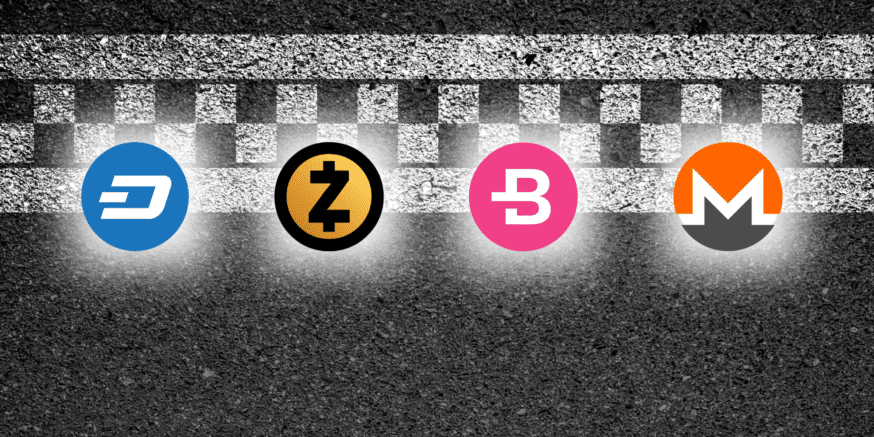Coins Competing to be Crypto’s Top Privacy Option
Although personal information isn’t tied to Bitcoin addresses, all it takes is a little snooping for someone to be able to connect you with your purchases. Even if you aren’t buying illicit substances, you may not want your balances and spending history openly available to other parties.
Thank goodness for privacy coins. Several people realized this Bitcoin shortcoming and created coins to keep your activity anonymous. In this article, we’re going to analyze some of these coins and outline why or why not they should be the top choice.
Dash

A fork of Bitcoin, Dash (short for Digital Cash) is currently leading the pack with a market cap of over $6 billion. Supporters commonly praise the coin for its almost instantaneous transactions when using its InstantSend feature. Although more so known for speed, you can also send coins anonymously through Dash’s PrivateSend.
The PrivateSend process is as follows:
- The platform breaks down your transaction inputs into specific denominations (0.01, 0.1, 1, and 10 DASH).
- Your wallet sends a request to the masternodes that you want to mix your coins.
- The masternodes then mix together the same coin denominations from different people.
- After that, they send the coins back to each person’s wallet. Each wallet receives the coins in a different address called a ‘change address’.
- Steps 2 through 4 repeat multiple times with each denomination.
Through this mixing process, Dash basically makes your coins indistinguishable from the other coins on the network. It’s like hiding a grain of sand on a beach.
Dash may not have the most robust privatization functionality, but its ease-of-use and current popularity may be hard for the other coins to overcome.
Pros
- Dash focuses heavily on its own mass adoption. The coin is available through ATMs around the world and is usually the next cryptocurrency accepted in stores after Bitcoin, Litecoin, and Ethereum.
- As a fork of Bitcoin, the coin includes much of the technology that makes Bitcoin so great.
Cons
- There’s some controversy about Dash creator, Even Duffield’s, coin supply. Opponents argue that he unfairly instamined the first million or so coins giving him an unproportionate amount of control.
- Some people also claim that, because the PrivateSend feature is optional, Dash isn’t truly private. You could possibly trace the supposedly anonymous transactions if they’re connected with non-private ones.
Monero

Monero is often touted as the privacy crypto king. The coin has replaced Bitcoin as the go-to currency for dark web purchases. Sitting at a market cap of ~$4.8 billion, Monero is relatively stable in times of market volatility.
By default, Monero is cryptographically private and includes several anonymity features. The coin uses stealth addresses for transactions to remove their connection to the blockchain. This prevents any links a transaction may have with your wallet and hides your transaction information from other people.
Other than stealth addresses, Monero uses Ring Confidential Transactions (RingCT) – a protocol similar to the ring signatures utilized by other privacy coins. With RingCTs, the network can verify transaction details without having to reveal the amount associated with them.
The Monero team is consistently adding new privacy features like Tails OS integration and Kovri, an overlay-network that obscures your IP address.
Pros
- Popularity among dark web users is a solid indicator that Monero’s privacy is top notch.
- Monero’s redundant layers of privacy protection allow the coin to be truly fungible. This means that all Monero coins are interchangeable and won’t diminish in value based on their history.
Cons
- Monero is less beginner friendly than other coins available. This could stifle mass adoption.
- Developing with Monero is fairly difficult. Because of this, many wallets don’t support it and there are a limited number of merchants who accept it.
[thrive_leads id=‘5219’]
Zcash

Out of the coins in this list, Zcash is the only one that uses zero-knowledge Succinct Non-Interactive Argument of Knowledge proofs (zk-SNARKs). This privacy method is used to prove that the transactional information you send is true without having to reveal the actual details of the transaction. In essence, zk-SNARKs encrypt all transactional data.
Like Dash, privacy is just an option for Zcash users. Additionally, the team states that Zcash doesn’t:
- Encrypt data for multisignature
- Obfuscate IP addresses
- Protect against transactions with public cryptocurrencies
The lack of these privacy features has caused some community members to write-off Zcash as a proper anonymous coin. That being said, the coin has the support of notable advisors such as Gavin Andresen (Bitcoin Foundation Chief Scientist) and Vitalik Buterin (Ethereum Creator).
Pros
- zk-SNARKs appear to be a good, lightweight solution to privacy and anonymity. Even Ethereum will be implementing them soon.
- The Zcash team includes computer science and cryptography specialists from reputable universities around the world.
Cons
- Optional privacy has the potential to compromise the entire network.
- The Zerocoin Electric Coin Company owns Zcash. This brings a level of centralization that many people aren’t comfortable with.
Bytecoin

Bytecoin was created in 2012 making it one of the oldest cryptocurrencies. In fact, Monero originated as a Bytecoin fork.
Bytecoin uses the CryptoNote protocol to keep anonymity. This protocol includes a mixture of one-time stealth addresses and ring signatures to keep all transactions private.
The coin has a history of split developer camps, numerous forks, and an uncertain beginning but this seems to have recently changed. The current development team has a renewed focus on transparency and communication with the community and has created a targeted roadmap.
Pros
- Bytecoin uses the CryptoNote protocol – a proven means of privacy.
- Bytecoin is the oldest coin on this list and has yet to be proven traceable.
Cons
- Even though it has a substantial market cap (~$1 billion), the coin seems to be relatively unknown. Its rebranding may be too little, too late.
- The blockchain community disagrees on whether or not the developers pre-mined the first coins. If this is true, a centralized power could emerge within the ecosystem.
Conclusion
It’s a tight race between these privacy coins – each with their own list of benefits and drawbacks. A clear winner still hasn’t emerged and new competitors are popping up seemingly every day. Verge and PIVX have gained quite a bit a popularity lately while Aeon and NAV Coin are slowly gaining steam as well.
Only time (and rigorous traceability tests) will separate the truly private coins from those just claiming to protect your anonymity.






